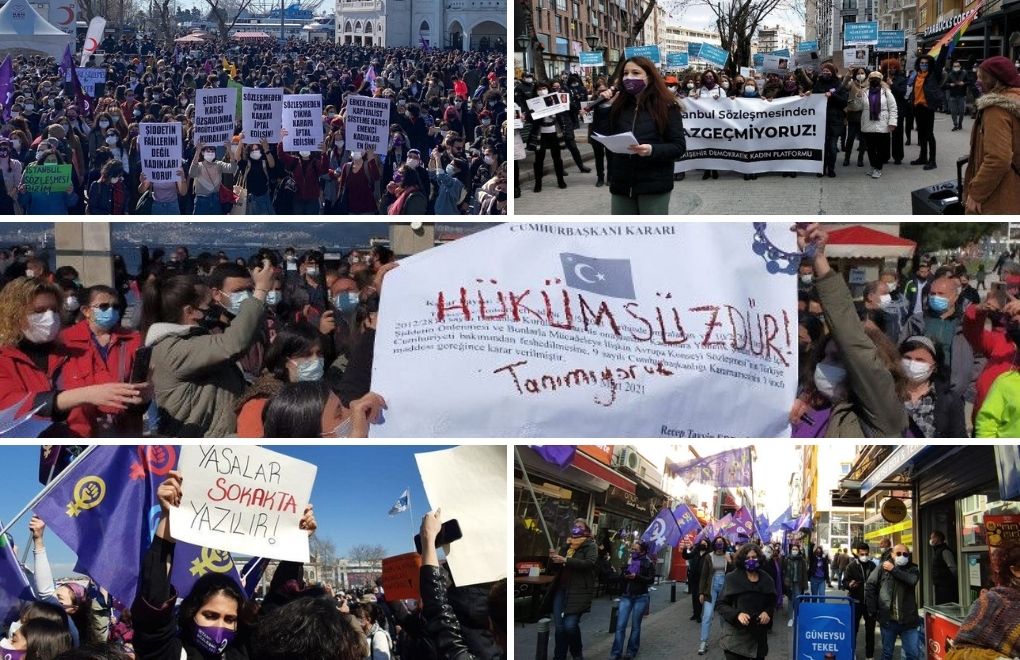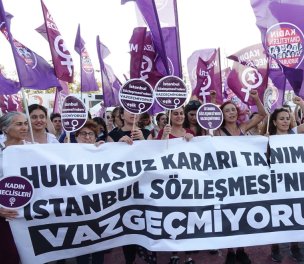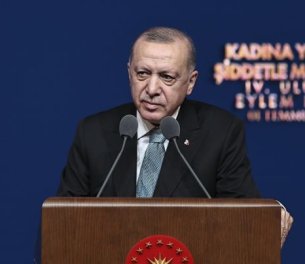Photo: Fatoş Erdoğan
Click to read the article in Turkish
A Council of State prosecutor has submitted her opinion in an appeal against the presidential decision for Turkey's withdrawal from the İstanbul Convention, a Council of Europe treaty on combating violence against women.
İYİ (Good) Party Chair Meral Akşener had filed an application with the country's top administrative court, demanding the stay of execution of the decree. Rejecting the application, the Council had started examining the case on the merits.
The application was filed with the Council of State, the country's top
Council of State Prosecutor Nazlı Yanıkdemir filed her opinion about the application on March 8 International Women's Day.
An international treaty that was accepted by the parliament by enacting a law can only be abolished in the same way, the prosecutor stated.
She also cited Article 6 of the Constitution on sovereignty.
"Sovereignty belongs to the Nation without any restriction or condition. The Turkish Nation shall exercise its sovereignty through the authorized organs, as prescribed by the principles set forth in the Constitution.
"The exercise of sovereignty shall not be delegated by any means to any individual, group or class. No person or organ shall exercise any state authority that does not emanate from the Constitution."
The prosecutor also cited Article 90 of the Constitution about international conventions, arguing that abolishing the convention was a case of an excess of power.
"The ratification of treaties concluded with foreign states and international organizations on behalf of the Republic of Turkey shall be subject to adoption by the Grand National Assembly of Turkey by a law approving the ratification."
The Presidential Decision No. 3718 pulling Turkey out of the İstanbul Convention was based on the first paragraph of article 3 of Presidential Decree No. 9, which included the phrase, "suspending the enforcement of their provisions and terminating [international agreements]." This phrase was against articles 6, 7 and 104 of the Constitution and an application should be filed with the Constitutional Court against the decree, according to the prosecutor.
If this opinion is not considered appropriate by the Council of State, the dispute will be concluded in accordance with the provisions in force, hence the presidential decision should be revoked, the prosecutor argued.
What happened?
President Erdoğan, on March 20, 2021, issued a presidential decision pulling Turkey out of the İstanbul Convention.
Turkey's decision was notified to the Council of Europe on March 23.
The Presidency Communications Directorate said the convention was abolished because it "legitimizes homosexuality."
Women have been protesting for the reinstatement of the convention, with many women's groups and opposition parties filing lawsuits for the cancellation of the presidential decision.
About İstanbul ConventionThe Council of Europe (CoE) "Convention on Preventing and Combating Violence Against Women and Domestic Violence", also known as "İstanbul Convention", is based on the understanding that violence against women is a form of gender-based violence that is committed against women because they are women. It is the obligation of the state to fully address it in all its forms and to take measures to prevent violence against women, protect its victims and prosecute the perpetrators. As of March 2019, it has been signed by 45 countries and the European Union (EU). On March 12, 2012, Turkey became the first country to ratify the Convention, followed by 33 other countries from 2013 to 2019 (Albania, Andorra, Austria, Belgium, Bosnia and Herzegovina, Croatia, Cyprus, Denmark, Finland, Estonia, France, Georgia, Germany, Greece, Iceland, Ireland, Italy, Luxembourg, Malta, Monaco, Montenegro, the Netherlands, Norway, North Macedonia, Poland, Romania, Portugal, San Marino, Serbia, Slovenia, Spain, Sweden, Switzerland). The Convention came into force on 1 August 2014. * Click here to read the full convention |
(EMK/VK)












